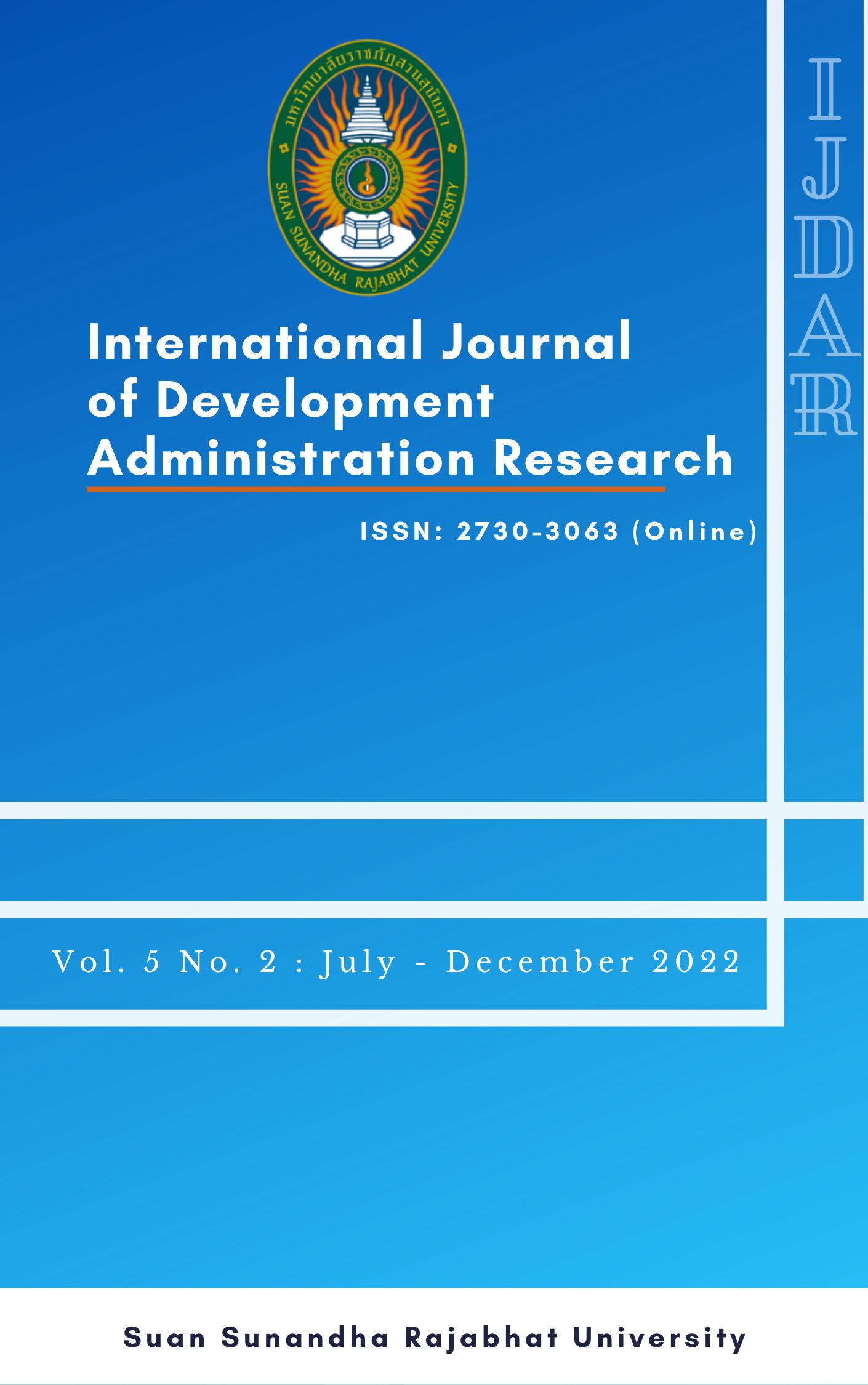The Study of Perspectives of Knowledge, Attitudes, Perceived Benefits, Risks, and Acceptance of the Covid-19 Vaccine
Main Article Content
Abstract
The Covid-19 disease is a primary global concern, and the vaccine is one of the most effective ways to prevent the virus infections. This study aimed to investigate the respondents’ knowledge, attitudes, perceived benefits, risks, and acceptance of Covid-19 vaccines and the correlation of those variables—the research design those variables. The research was designed by using the quantitative research method. The online questionnaires were distributed to 374 respondents by snowball sampling. The results revealed the mean scores of the respondents’ knowledge of vaccines at 4.50, the positive attitudes toward vaccines at 4.47, the perceived benefits of vaccines at 3.94, the risks of vaccines at 2.88, and vaccine acceptance at 4.06. Hypotheses testing presented that there was a positive relationship between variables: knowledge and attitudes with 0.463, knowledge and perceived benefits of vaccines with 0.519, knowledge and vaccine acceptance with 0.563, attitudes toward perceived benefits of vaccines with 0.351, attitudes toward vaccine acceptance with 0.408, perceived benefits of vaccine and vaccine acceptance with 0.503. However, two negative relationships illustrate knowledge and risks, and vaccine acceptance.
Article Details
References
Altmann, T., (2008). Attitude: A Concept Analysis. Nursing Forum, 43(3),144-50.
Butler, R. (2016). Vaccine Hesitancy: What it means and what we need to know in order to tackle it. J. Vaccine, 34,1643–1649.
Blastland, M., Freeman, A. L., van der Linden, S., Marteau, T. M., & Spiegelhalter, D. (2020). Five rules for evidence communication. Nature, 587, 362-364.
Bolisani, E., and Bratianu, C. (2018). The Elusive Definition of Knowledge. Emergent Knowledge Strategies. DOI 10.1007/978-3-319-60657-6_1
Chandon, P., Wansink, B. and Laurent, G. (2000). Journal of Marketing. A benefit congruency framework of sales promotion effectiveness. Journal of Marketing, 64(4), 65-81.
Dawson, K. P. (1992). Attitude and assessment in nursing education. Journal of Advanced Nursing, 17, 473–479.
Israel, Glenn D. (1992). Sampling the Evidence Of Extension Program Impact. Program Evaluation and Organizational Development, IFAS, University of Florida. PEOD-5. October.
Karlsson, L. C., Soveri, A., Lewan, S., Karlsson, L., Karlsson, H., Nolvi, S., ... Antfolk, J. (2020). Fearing the disease or the vaccine: The case of COVID-19. Personality and Individual Differences, 172, 110590.
Kerr, J.R.; Freeman, A.L.J.; Marteau, T.M.; van der Linden, S. (2021). Effect of Information about COVID-19 Vaccine Effectiveness and Side Effects on Behavioural Intentions: Two Online Experiments. Vaccines, 9(4), 379.
Leung Y. (2013). Perceived Benefits. In: Gellman M.D., Turner J.R. (eds). Encyclopedia of Behavioral Medicine. New York: Springer.
O’Neill, O (2017). Some limits of informed consent. Journal of Medical Ethics,29(1),103–106.
O’Neill, J. (2020). Case for persuasion in parental informed consent to promote rational vaccine choices. Journal of Medical Ethics, 48(2), 106-111.
Outreville, J. (1998). The Meaning of Risk. Boston, MA: Springer US.
Parmet, W.E. Informed consent and public health: Are they compatible when it comes to vaccines? J. Health Care Law Policy 2005, 8, 71–110. 22.
Pallant, J. (2005). SPSS survival manual. 2nd edn. Berkshire: McGraw-Hill education.
Reiss, D.R.; Karako-Eyal, N. (2019). Informed Consent to Vaccination: Theoretical, Legal, and Empirical Insights. Am. J. Law Med, 45, 357–419.
Roy, D. N., Biswas, M., Islam, E., & Azam, M. S. (2022). Potential factors influencing COVID-19 vaccine acceptance and hesitancy: A systematic review. PloS one, 17(3), e0265496.
Russell, B. (1972). A history of western philosophy. New York: Simon and Schuster.
Šotić, A. and Rajić R. (2015). The Review of the Definition of Risk. Online Journal of Applied Knowledge Management, 3, 3.
Shakeel, C. S., Mujeeb, A. A., Mirza, M. S., Chaudhry, B., & Khan, S. J. (2022). Global COVID-19 vaccine acceptance: a systematic review of associated social and behavioral factors. Vaccines, 10(1), 110.
World Health Organization (2021). WHO Situation Report. Retrieved from https://www.who.int/ publications/m/item/weekly-epidemiological-update.
Xiang, Y. T., (2021). Attitudes toward COVID-19 vaccines in Chinese college students. International Journal of Biological Sciences, 17(6), 1469-1475.
Yan, Z.-P., Yang, M., Lai, C.-L. (2021). COVID-19 Vaccines: A Review of the Safety and Efficacy of Current Clinical Trials. Pharmaceuticals, 14, 406.


